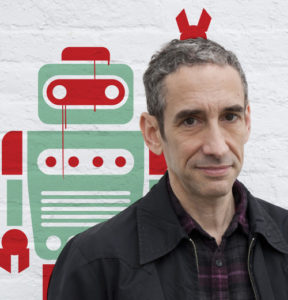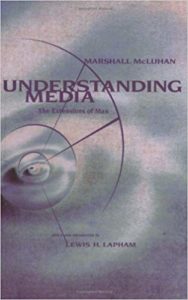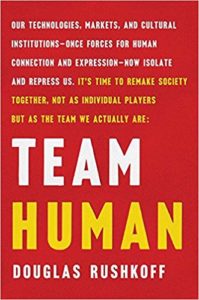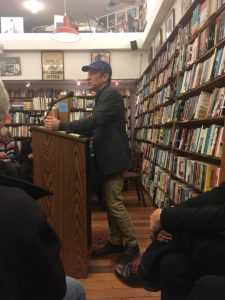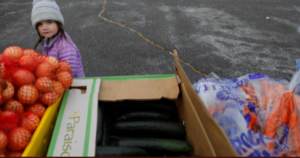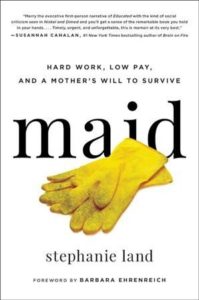Team Human
January 29, 2019City Lights Book Store/San Francisco
“Right now, I’m reading a galley of Ghost Work: How to Stop Silicon Valley from Building a New Global Underclass, by Mary L. Gray and Siddharth Suri.”
What are 3 books you would you never part with?
- Robert Anton Wilson’s Cosmic Trigger
- Marshall McLuhan’s Understanding Media
- The Tanakh
What writers/artists/people do you find the most influential to the writing of this book and/or your writing in general?
David Lynch, Timothy Leary, Aleister Crowley, Karen Armstrong, Marshall McLuhan, Martin Buber, Emmanuel Levinas, Mircea Eliade, Howard Rheingold, Frances Moore Lappé, Karl Marx, W.E.B. Du Bois, Terence McKenna, Fred Turner, Zeynep Tufekci.
“Find the others. Restore the social connections that make us fully functioning humans, and oppose all conventions, institutions, technologies, and mindsets that keep us apart.
Our values–ideals such as love, connection, justice, distributed prosperity–are not abstract. We have simply lost our capacity to relate to them” (p. 211).
Harnessing wide-ranging research on human evolution, biology, and psychology, Rushkoff shows that when we work together we realize greater happiness, productivity, and peace. If we can find the others who understand this fundamental truth and reassert our humanity―together―we can make the world a better place to be human.
[Named one of the “world’s ten most influential intellectuals” by MIT, Douglas Rushkoff is an author, media theorist, professor, and documentarian who studies human autonomy in a digital age.]
Rushkoff’s talk at City Lights Book Store in San Francisco…1.29.19…will be recorded for a future podcast.
Poverty is real and persuasive.
CBS
Aimee Picchi
40% of Americans only one missed paycheck away from poverty.
“This is not a problem of just low-income people — this is a problem of middle-class people and even people with higher income without enough savings,” Wiedrich said. “If they hit a shock, they are in the same boat. Maybe they can’t pay their mortgage” or must make choices about what bills to pay.
Another financial challenge that keeps many people the edge is housing. Homes are becoming less affordable across the country, with median home values now early four times higher than median incomes — experts generally advise against spending more than three times income on housing. Similarly, half of all renters say they spend more than a third of their income on rent and utilities.
Millions of middle-class Americans are just one missed paychecks away from poverty, with 4 of 10 considered “liquid-asset poor,” or without enough money socked away to cope with even a sudden disruption in income.
Despite the lowest unemployment rate in decades and solid economic growth, many Americans are on thin financial ice, Prosperity Now found. Minority households are particularly lagging on key measures such as income and wealth, the study found. Across the board, more than 1 in 10 American households fell behind in their bills in the last year, a signal that many are struggling with rising costs and stagnant incomes.
https://www.cbsnews.com/news/40-of-americans-one-step-from-poverty-if-they-miss-a-paycheck/
Souther Poverty Law Center/Press-Citizen.com
“Almost 1,400 people drove with suspended/revoked licenses from 2016-2019 in Iowa, 1 of 40+ states that suspends licenses for nonpayment of fees & fines. If people can’t drop their kids off at school or drive to work, how are they supposed to pay the bills?
License suspensions have a greater impact on low-income families.
Unpaid traffic tickets can be used as a reason to suspend someone’s license in more than 40 states, including Iowa (and 40 other states). Court debt includes all unpaid fines, penalties, court costs, fees, criminal surcharges, victim restitution, court-appointed attorney fees, among other items.”
NPR/Fresh Air
Terry Gross
“While raising her young daughter as a single mother, Stephanie Land cleaned houses through an agency to scrape by. It was back-aching work and the pay — $8.55 an hour to start, $9.25 an hour two years in — just wasn’t enough.
Land, who had left an abusive relationship, lived for a time in a homeless shelter with her daughter. She supplemented her housecleaning income with government assistance, at one point accruing seven types of aid simultaneously, including housing and utility assistance, food stamps, child care grants and Medicaid.
Looking back, she says, “There’s no way that you can work full time [at] minimum wage and have a family. It’s impossible.”
